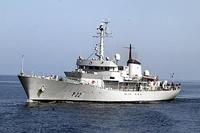Naval patrol cuts leave Ireland vulnerable to drug-trafficking

Cost-saving measures implemented by the Department of Defence leave Ireland vulnerable to drug smugglers, an anti-drugs group says. By Vincent Ryan.
Citywide has criticised the government's decision to reduce the number of patrolling days that the Irish Navy carry out as a deterrent to drug smugglers.
Ireland is already seen as a weak spot by international drug traffickers looking for an easy route to the lucrative UK and European markets. The government now plans to cut a further 100 routine patrolling days from the Navy’s operations as part of a cost saving measure.
Daithi Doolan of Citywide said he was very critical of the government's cut backs at a time when drug use was rising across the country. He said: “I’m very critical of any roll back on activity that is attempting to control supply reduction which is a key pillar of the national drug strategy. We need to be resourcing all the pillars of the national drug strategy particularly supply reduction at a time when there is increased drug use and drug crime across the state.”
The new Minister of Defence, Tony Killeen, has slashed the number of days that the navy patrol to 1480 days for 2010. As recently as 2005 the navy were carrying out 1681 routine patrolling days, and last year they successfully completed 1588 patrolling days.
Drug seizures in Ireland were down dramatically last year with the total value of drugs seized put at 38.6m. In both 2008 and 2007 the value of drugs seized was boosted by huge finds of illegal drugs being trafficked in to Ireland in private yachts.
In Cork, in 2007, a boat with €105m euro worth of cocaine got into trouble off the Cork coast, and again in 2008 another private yacht with almost half a billion euro of cocaine on board was escorted by an Irish naval vessel into the port of Casteltownbere.
Sinn Fein’s Aengus O’Snodaigh, who asked a parliamentary question in relation to the matter, accused the minister of avoiding the issue and not taking into account that the LE Aoife will be out of service for up to six months.
He said: "The Minister for Defence avoided answering my question as to the effect of the cutback in naval patrolling days and the Navy's ability to carry out its responsibilities in relation to tackling the drugs trade....the cuts to patrolling days, coupled with the withdrawal of the LE Aoife for 'routine' maintenance for up to six months will seriously hamper the ability of the naval service to respond to drug smugglers and even carry out their other duties."
A spokesperson for the defence forces said that the navy will continue to play a vital role in the fight against drugs trafficking but that this role is increasingly intelligence based.
He said: “Naval Service patrols at sea undoubtedly act as a deterrent in the fight against drug trafficking. However, this role is increasingly governed by intelligence-led operations and greater co-operation between both national and international agencies. Government measures to improve law enforcement on drugs, including the establishment in 1993 of a joint task force involving the Garda Síochána, the Customs Service and the Naval Service, have helped to maximise the effective use of Naval Service resources in combating drug trafficking.”
